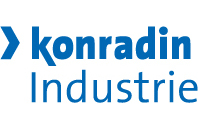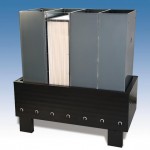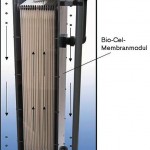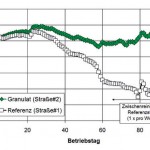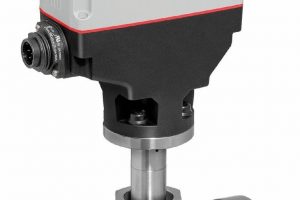In the majority of MBR plants, submerged membrane modules are used for the membrane stage. The driving force behind a new technology in this field is an increasing demand for more environmentally friendly cleaning of the modules. The Bio-Cel module permits chemical-free cleaning in conjunction with a mechanical cleaning process utilising granulate and achieves a significant enhancement of flux. The solution has meanwhile been successfully tested in a pilot unit in collaboration with Darmstadt University of Technology.
W. Ruppricht, S. Krause
Membrane bioreactors (MBR) combine classic biological wastewater treatment with membrane technology. The biomass is separated from the cleaned wastewater by means of membranes (usually ultra or micro-filtration). The great advantage of this method is that the membrane acts as a barrier to biomass, particles and bacteria, leading to a substantial improvement in effluent quality compared to conventional, purely biological techniques – in terms of solids and hygienic parameters.
The unification of biological and membrane technology to treat wastewater additionally increases the concentration of biomass in the activated sludge tank. It is thus possible to augment the capacity of a traditional activated sludge plant by converting it accordingly or to reduce the footprint of a new plant, in which case a further space saving is realised because the final sedimentation stage can be dispensed with. Since the discharge from an MBR plant is absolutely free of solids, this innovative solution is ideally suited for supplementary treatment steps with reverse osmosis or nano-filtration as well as UV or ozone.
Cleaning is still essential
Microdyn-Nadir’s Bio-Cel module successfully unites the benefits of flat sheet membranes and hollow fibre modules. This space saving module is insensitive to braiding and sludge deposition and was developed on the basis of a back-flushable flat sheet membrane. It only requires simple pre-treatment of the feed flow and facilitates extended operation between cleaning cycles. However, even with this novel development, chemicals still cannot be dispensed with completely for intensive cleaning.
The point of cleaning the membrane modules in an MBR plant is to remove the deposits that form on the membrane and reduce its permeability during operation. A distinction is made between scaling and fouling. Scaling refers to inorganic deposits, usually calcium carbonate or ferric salts, that have to be removed by cleaning with acids. The acids that are used for this purpose are mainly organic, for example citric, formic or acetic acid, and they are unobjectionable from an environmental viewpoint because the spent cleaning solutions can be disposed of without any problems with the help of membrane biology. Fouling, on the other hand, is caused by organic deposits, which is why it is often also called biofouling. Fouling can be eliminated with oxidants like hydrogen peroxide or sodium hypochlorite (NaOCl). Chlorine has become established as the norm for removing fouling in MBR plants due to its excellent cleaning efficiency. Unfortunately, it has the drawback that the concentrations in which it is used – up to 2000 mg/l in some cases – result in the formation of large quantities of AOX compounds. AOX is a sum parameter for so-called „adsorbable organic halogen“ compounds, which are classified as environmentally harmful substances on account of their ecotoxicity. Although MBR technology is in principle a very eco-friendly process as far as membrane cleaning is concerned, it does have this important ecological disadvantage.
Chemical-free process
A study was carried out to determine the Bio-Cel module’s suitability for chemical-free cleaning in activated sludge, bearing in mind that the permeability of the membrane must not be impaired. Previous trials had already confirmed that the module can remain in use for over a year without intensive cleaning (i. e. cleaning the Bio-Cel in a chemical bath). Chemical back-flushing in an activated sludge tank suffices. However, the new study revealed that permeability is lost despite back-flushing with chemicals and that intensive cleaning is unavoidable sooner or later.
The starting premise for this investigation into chemical-free cleaning of Bio-Cel mod-ules was the idea that, using mechanical means, incipient deposits on the membrane can be prevented from forming or deposits that are already present continuously removed. The plastic granulate used for this purpose needed to flow upward between the membrane pockets with the aeration that is essential to operate the modules, in order to produce the mechanical cleaning action. The granulate density had to be such that it is slightly heavier than the activated sludge and thus able to settle outside the module, but not so heavy that it cannot be whirled up again and conveyed up to the top by the aeration underneath the module.
Action of the granulate
Two Bio-Cel modules, each with a membrane area of 10 m², were installed in two parallel filtration chambers on a pilot plant scale (under identical conditions). One module (reference) was operated conventionally in activated sludge without adding granulate, while the other (granulate) was required to clean a mixture of sludge and granulate (Bio-Cel-MCP = mechanical cleaning process). Both modules were set to a flux of 15 l/m² h for the first three months. After around seventy days in service, the permeability of the reference module had fallen to approximately 40 % of the initial value whereas the MCP module had not yet lost any of its permeability. The module without granulate was then maintained at a constant permeability by introducing intermediate cleaning (back-flushing with NaOCl).
In the next trial phase, the flux of the mod-ule with granulate (MCP) was increased to 40 l/m² h. This high flux was what eventually triggered a reduction in permeability. The rate was then kept constant at 30 l/m² h for a period of several weeks. The Bio-Cel-MCP module has been cleaning without chemicals throughout the trial (500 days so far and still continuing). The results for the two modules are directly compared in the table.
In a follow-up test, granulate was also added to the activated sludge in the reference module. After only seven days, this Bio-Cel module had likewise regained its original permeability. This shows that even subsequent cleaning with granulate has the desired effect on the modules.
Constant flux
The study findings demonstrate that the Bio-Cel module can be cleaned mechanically by adding granulate to the activated sludge, in other words chemical-free cleaning is possible. The use of a Bio-Cel-MCP keeps the permeability – and hence the performance – of the module at a constant level while actually increasing the hydraulic flux. Furthermore, the MCP is even suitable for external module cleaning if the membrane is already fouled.
In future, this cleaning process with Bio-Cel modules will additionally enhance the environmental compatibility of MBR plants and problems with AOX compounds will become a thing of the past. It will also improve plant availability and pave the way for the construction of even more compact – and accordingly more efficient – facilities owing to the higher average flux.
Hall 4.2, Booth O15
Online-Info www.cpp-net.com/2209402
Share:
